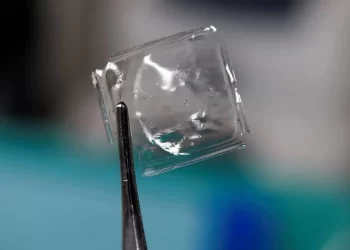- The asteroid that killed most dinosaurs 66 million years ago left behind traces of its own origin.
- Researchers think they know where the Chicxulub impactor came from based on levels of ruthenium.
- The impactor likely formed in the outer solar system before migrating to the asteroid belt.
A team of researchers think they know the origin of a massive space rock that hit Earth and killed off almost all the dinosaurs 66 million years ago.
Their findings could help NASA in its search for potentially hazardous asteroids that pose a significant threat to life on Earth.
Asteroids have different chemical makeups depending on where they formed in our solar system.
To determine the dino-killing asteroid’s origin, researchers examined the various elements in samples taken from several locations dating to the time of the mass extinction.
In particular, they looked at the element ruthenium. It’s a rare metal on Earth but is more abundant in asteroids.
Ruthenium levels can be a good indicator of whether an asteroid “originally formed in the outer solar system or in the inner solar system,” Mario Fischer-Gödde, one of the researchers, told Business Insider.
Fischer-Gödde and his colleagues found that, unlike many other impactors over the last 541 million years, the Chicxulub impactor that killed the dinosaurs and up to 75% of all life on Earth formed in the outer — not the inner — solar system.
However, the impactor likely made its way to the inner solar system in the asteroid belt long before it hurtled toward Earth. That’s because in the early days of the solar system, Jupiter migrated and its gravitational influence scattered more distant asteroids closer to the sun in the process, Fischer-Gödde said.
NASA doesn’t know where all the dangerous asteroids are
CHARLY TRIBALLEAU/Getty Images
Despite the rarity of huge asteroid strikes, NASA and other space agencies are racing to learn all they can about potentially harmful rocks that could trigger another mass extinction event. Because it only takes one.
There are still many unknowns about these rocks, including where some of them are and which types may pose the most threat.
Understanding more about the origin of major asteroid strikes in Earth’s past could help NASA know where to look for future risks.
With the ruthenium findings, “we are a step further in zooming in on the exact object” that created the Chicxulub crater, Jan Smit, a professor emeritus at the Vrije Universiteit Amsterdam who was not involved in the research, told Business Insider via email.
An asteroid type that rarely hits Earth did unbelievable damage
solarseven/Getty Images
Fischer-Gödde and his colleagues examined samples from five other impacts that happened in the last 541 million years.
Their levels of ruthenium showed that most of the objects were S-type asteroids, which are found in the inner solar system.
Meanwhile, the samples taken from the Cretaceous-Paleogene (K-Pg) boundary, where the Chicxulub impactor hit, suggested that the object was a C-type asteroid, which typically live in the outer solar system.
Earlier studies suggested the Chicxulub impactor was a C-type asteroid but this latest ruthenium data adds to the supporting evidence, Smit told BI.
About 80% of the meteorites that have hit Earth are fragments of S-type asteroids, Fischer-Gödde said.
It’s not clear why S-type impactors are more common, but Fischer-Gödde thinks it might be that C-types tend to break apart more and don’t make it through the Earth’s atmosphere.
“So far we cannot really say whether one or the other asteroid type would be more likely to cause a mass extinction event,” Fischer-Gödde said in a follow-up email. He said asteroids may have contributed to older mass extinction events, like the one during the Late Devonian period. Future research could explain the origins of these asteroid strikes as well.
However, the devastation from the Chicxulub impactor shows that a C-type can be disastrous for Earth. It was a combination of factors, from its size to where it hit, that led to its widespread destruction.
“It’s a big kind of cosmic coincidence, and we all should be thankful for this because otherwise maybe the planet would look very different nowadays,” Fischer-Gödde said.
The researchers published their findings in the journal Science.










 American Dollar Exchange Rate
American Dollar Exchange Rate